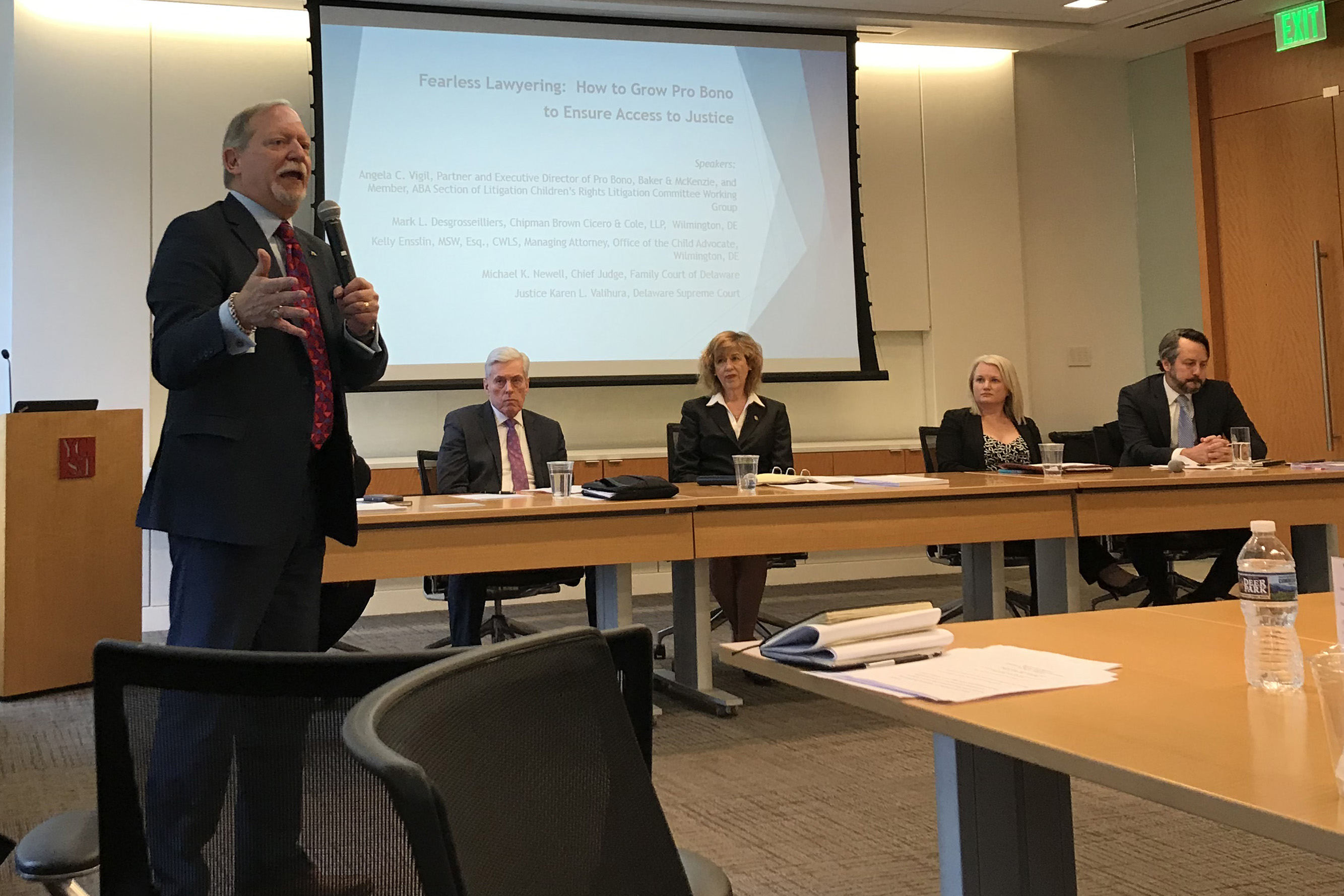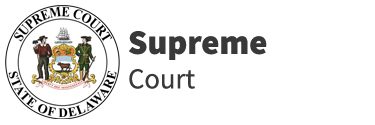Access to Justice Commission
Criminal Justice Improvement Commission
Improved Criminal Code
Supreme Court Justice Valihura and Family Court Chief Judge Newell promote pro bono representation at American Bar Association Event
Justice Karen L. Valihura of the Delaware Supreme Court and Chief Judge Michael K. Newell of the Delaware Family Court promoted the virtues of representing indigent litigants to a meeting of the American Bar Association (ABA) held on Feb. 27, 2019 in Wilmington at the law offices of Young Conaway, Stargatt & Taylor. Read more about pro bono representation at ABA event.

Access to Justice Pro Bono Challenge
The Pro Bono Challenge will begin on January 1, 2019 and run through December 31, 2019.
Participants are asked to commit to dedicating at least 1% of their professional hours for the 2019 calendar year to pro bono service to indigent individuals and families.
The Delaware Access to Justice Commission Announces The Pro Bono Challenge.
Access to Justice Civil Subcommittees Final Report
The Delaware Supreme Court created the Access to Justice Commission in 2014 “to identify the critical needs related to access to justice in Delaware and to develop realistic and cost effective solutions to meet those needs.” In order to accomplish that directive, three subcommittees focusing on civil justice were created:
- The Subcommittee on the Efficient Delivery and Adequate Funding of Legal Services to the Poor (the Funding Subcommittee);
- The Subcommittee on Judicial Branch Coordination in Helping Pro Se Litigants (the Pro Se Subcommittee); and
- The Subcommittee on Promoting Greater Private Sector Representation of Underserved Litigants (the Pro Bono Subcommittee).
Access to Justice Civil Subcommittees Final Report
View/print report in sections:
- Report Cover
- Report Overview
- Funding Subcommittee Report
- Pro Se Subcommittee Report
Pro Se Subcommittee Report Exhibits - Pro Bono Subcommittee Report
Pro Bono Subcommittee Report Exhibits
Disparity Study
Following through on recommendations issued by criminal justice experts from Bryan Stevenson’s Equal Justice Institute and the Quattrone Center for the Fair Administration of Justice during a series of public hearings on criminal justice reform in the fall of 2015, the Delaware Access to Justice Commission’s Committee on Fairness in the Criminal Justice System on Sept. 23, 2016 released an independent study that looks into the issue of racial disparities in the Delaware criminal justice system
Press release: Study on the role of race in the Delaware criminal justice system
Report: Evaluating the Role of Race in Criminal Justice Adjudications in Delaware
Background
The Delaware Access to Justice Commission held its kickoff meeting on December 15, 2014 at the Arsht Hall University of Delaware, Wilmington, Delaware. The Commission has been established by the Delaware Supreme Court to undertake the task of examining the justice system to identify any barriers to access to justice that may exist, and to develop recommendations designed to improve access to justice for the citizens of Delaware. To increase its accountability, the voting membership of the Commission are comprised entirely of private citizens — outstanding community and business leaders, lawyers and other professionals from across the state, who have the flexibility to make whatever policy recommendations they believe will be best for Delaware.
The Commission, working through committees, will initially focus on four important access to justice needs in Delaware — the efficient delivery and adequate funding of legal services to the poor; Judicial Branch coordination in helping self-represented litigants; the need to increase the pool of legal advisors to help litigants of limited means by exploring roadblocks confronting those lawyers; and fairness in the adult criminal justice system. The Commission has been tasked with completing its initial work in two years, with various committees conducting research, holding public hearings and making recommendations throughout that time period. The Amended Order establishing the Access to Justice Commission and the Commission and subcommittee membership list can be found below.
Press Release: Delaware Access to Justice Commission Gets Underway
Amended Order establishing the Access to Justice Commission
Access to Justice Commission Members
Committee Membership Lists:
Efficient Delivery and Adequate Funding of Legal Services to the Poor
Judicial Branch Coordination in Helping Pro Se Litigants
Promoting Greater Private Sector Representation of Underserved Litigants
Fairness in the Criminal Justice System
Access to Justice Public Hearings
The Access to Justice Commission's Committee on Fairness in the Criminal Justice System conducted a series of public hearings between October 22, 2015 and December 9, 2015. The Committee, comprised of prosecutors, defense attorneys, law enforcement, community leaders and academics, examined the causes of racial disparity in the criminal justice system and proposed ways to reduce those disparities.
Experts from the University of Pennsylvania Law School's Quattrone Center for the Fair Administration of Justice, Bryan Stevenson's Equal Justice Initiative, and the University of Delaware presented research on initiatives to reduce crime and increase racial equity.
Access to Justice Committee Reports 2015
- A Report on Alternatives to Incarceration, Delaware Access to Justice Commission's Committee on Fairness in the Criminal Justice System — prepared by the Equal Justice Initiative, October 2015
- Improving Fairness and Addressing Racial Disparities in the Delaware Criminal Justice System, A Memorandum to the Subcommittee on Fairness in the Adult Criminal Justice System, Delaware Access to Justice Commission — Quattrone Center for the Fair Administration of Justice, September 2015
- Understanding the Lived Experience of Dis-Opportunity, Access to Justice Commission Hearing: Education and Root Causes Committee — Yasser Arafat Payne, Ph. D.,Associate Professor, Department of Black American Studies, University of Delaware
- Justice Commission Report on Drugs and Health — Lana Harrison, Ph.D. Dept. of Sociology & Criminal Justice, University of Delaware
- Unconscious Bias and the Criminal Justice System — Leland Ware, Louis L. Redding Professor University of Delaware. This presentation is derived from, A Comparative Analysis of Unconscious and Institutional Discrimination in the United States and Britain, 36 Ga. J. Int'l & Comp. L. 89 (2007)
- Literature Review: The Effects of Parental Incarceration on Minor Children — Janice Barlow, Director, KIDS COUNT in Delaware, University of Delaware Center for Community Research and Service, Presented to the Delaware Access to Justice Commission
- Parents Behind Bars: What Happens to their Children? — Report prepared by Child Trends, October 2015.
- A Report on the Root Causes of Racial Disparities in Delaware's Criminal Justice System, Delaware Access to Justice Commission's Committee on Fairness in the Criminal Justice System — prepared by the Equal Justice Initiative, October 2015
- Overview of Poverty in Delaware, Center for Community Research & Service, October 2015
- A Report on Bail & Pretrial Detention, Delaware's Access to Justice Commission's Committee on Fairness in the Criminal Justice System — prepared by the Equal Justice Initiative, October 2015
- Improving Fairness and Addressing Racial Disparities in the Delaware Criminal Justice System, A Memorandum to the Subcommittee on Fairness in the Adult Criminal Justice System, Delaware Access to Justice Commission — Quattrone Center for the Fair Administration of Justice, September 2015
- A Report on Racial Bias in Prosecutorial Charging Decisions, Plea-Bargaining, and Sentencing, Delaware's Access to Justice Commission's Committee on Fairness in the Criminal Justice System — prepared by the Equal Justice Initiative, November 2015
- Improving Fairness and Addressing Racial Disparities in the Delaware Criminal Justice System, A Memorandum to the Subcommittee on Fairness in the Adult Criminal Justice System, Delaware Access to Justice Commission — Quattrone Center for the Fair Administration of Justice, September 2015
- A Report on the Role of Police Practices in Continuing Racial Disparities in Delaware's Criminal Justice System, Delaware's Access to Justice Commission's Committee on Fairness in the Criminal Justice System — prepared by the Equal Justice Initiative, November 2015
- Improving Fairness and Addressing Racial Disparities in the Delaware Criminal Justice System, A Memorandum to the Subcommittee on Fairness in the Adult Criminal Justice System, Delaware Access to Justice Commission — Quattrone Center for the Fair Administration of Justice, September 2015

